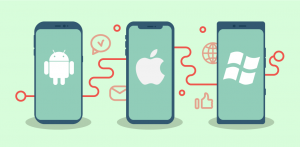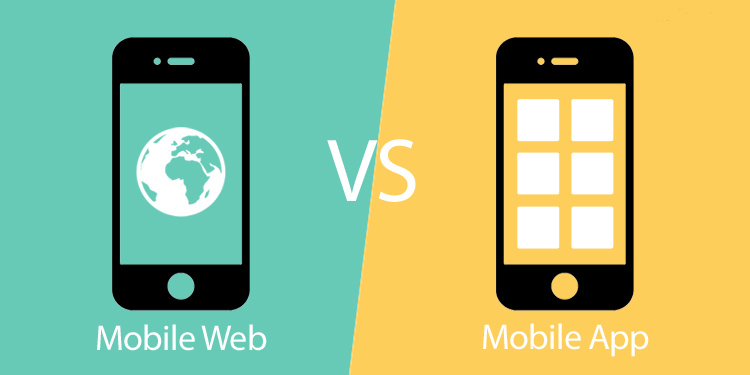Have you heard that the average user spends over 3 hours a day consuming mobile content, and 89% of this time they spend using apps? Moreover, specialists think that by 2020 there will be 6.1 billion smartphone users around the world and most of the digital content will actually come from mobile apps. With this in mind, it becomes obvious that the traditional online business is evolving, and if you want to stay relevant in the market, you have to cater to mobile users more. Otherwise, you might find yourself left behind soon.
Why are mobile apps more efficient than websites?

Even if your website has a responsive design, it is not enough for covering a wider mobile audience. Even if the interface is smooth and adapts to different screen sizes, the mobile version of your website can be viewed only via a browser. This intermediary between your website and the customer is completely unnecessary and fairly annoying. Even if your website is working perfectly, you can’t guarantee that the user’s browser doesn’t lag.
A mobile app, on the other hand, doesn’t require any intermediaries and offers better customer personalization. The user can set up certain preferences and adjust the application to their needs. In return, you will get a better insight into your target audience and its demands, because you will be able to collect and analyze much more personal data than the website statistics can provide.
Also, you can interact with your customers directly through notifications. Having a website, you would send an email to the user creating three barriers between them and your resource. First, they will need to log into their email system, then check the incoming letters and only after that they will be able to go to your website – if they still want to. Having an app, you can simply send a notification – push or in-app. Studies show that push notifications deliver up to 40% CTRs. Of course, you have to plan thoroughly and wisely how frequently the users will receive notifications to increase the conversion.
Even though apps usually require internet connection to work smoothly, there is a way to let the users perform some basic actions offline. Sure, websites can also display pages offline thanks to the cached data, but the functionality is limited in this case. A high-quality application will run much faster than the website.
With an app, you can reach more potential customers. First of all, users can encounter it in the App Store or Google Play Store, find it interesting and useful, and download. In addition, the application icon is always displayed on the mobile screen, so it will be a subtle reminder of your brand.
Needless to say how many advanced functions an app can offer. It can access the inherent features of a smartphone or a tablet, and use them to improve the customer experience. This, in turn, will enhance the user interaction with your brand.
What does it take to turn a website into a mobile app?
When it comes to turning your website into a mobile app, the first thing you have to do is to choose the development method. It can be a native or a cross-platform app. The first option is more expensive, so you should decide whether you need the native application or not.
A native app

It is an application that is developed according to the requirements of a certain operating system (Android or iOS).
Pros:
- enhanced user experience;
- better visibility in the App Store or Play Store;
- high performance.
Cons:
- runs only on a certain OS.
The native app will be the right choice if it is to become an integral part of your business. For example, if it’s a fitness application, it will require lots of the mobile device’s resources and power. Thus, you have to make sure it can work as smoothly as possible.
A cross-platform app

Such an application is compatible with various operating systems and, therefore, devices.
Pros:
- can cover more users;
- has a shorter development period (if the team is highly experienced);
- can bring more profit;
- easier to roll out updates.
Cons:
- worse performance due to multi-functional components;
- harder to provide a seamless UX.
Cross-platform apps are great for content distribution. Since they demand quite a lot of resources, it is better if a set of functions is limited. So if you need an educational or information-giving application, it is the right choice for you.
Mind user experience

Once you have decided on the development method, you need to understand which features of the website you will include in the app. It shouldn’t be overwhelming. Still, it should provide users with enough functional components for proper interaction.
Since the application is expected to facilitate customer interaction, the interface must be user-friendly – your clients have to understand how to work with the app intuitively. If there are lots of functions, you should consider adding text hints. To increase the conversion rate, it is important to plan the UX design so that the users are forced to perform the target action (a purchase, for example).
Don’t underestimate the importance of MVP
MVP (Minimum Viable Product) is a prototype of the future app with minimum features. It helps to sparkle the early interest of users and test the application in real life. Using an MVP, developers can gain important feedback and insights that will help to build an improved app.
With an MVP you can even see if the market needs this application at all. If it fails, you can avoid spending money on the development of the product your customers don’t actually need.
Mobile app marketing

Before you upload the app to the Google Play Store or App Store, you have to understand how your users will find it. Will they stumble upon it searching for a certain kind of applications? Or will you inform the customers that you have an application when they come to your website? Think about the ways to attract attention to it, and do a good copywriting job describing your app when you submit it to the store.
The professional development team is the key to success
Choosing the right developer for your app is crucial. The poorly developed app will destroy your business idea completely. So, check several criteria before looking for the right team:
- Of course, well-known development studios have higher rates. But, by hiring a shady developer, you risk getting a low-quality app.
- Check the apps that the studio has already created. Read reviews in app stores, or even try one to understand if the product is good enough.
- Search the web to find genuine opinions about the developer.
- Look through the customers who was working with this studio.
It is important to keep up with the modern world that evolves at a supersonic speed. Think about turning your website into a mobile application now with us, so you can gain the audience before your competitors do.

